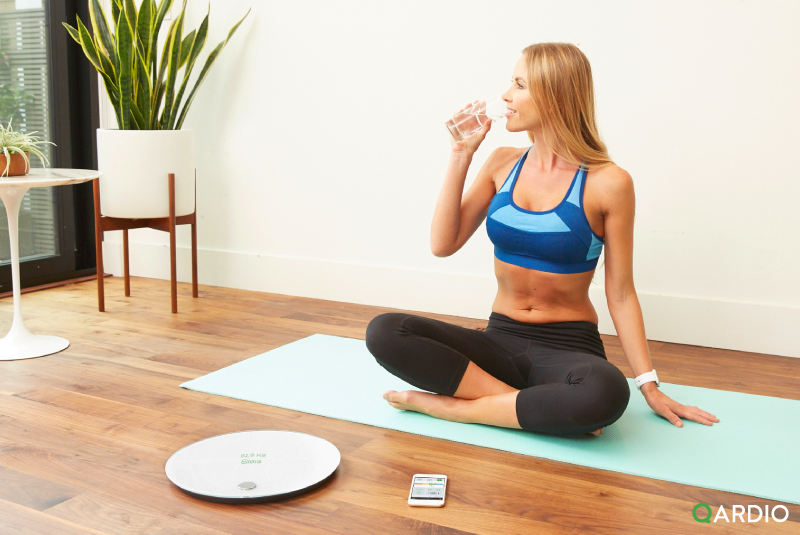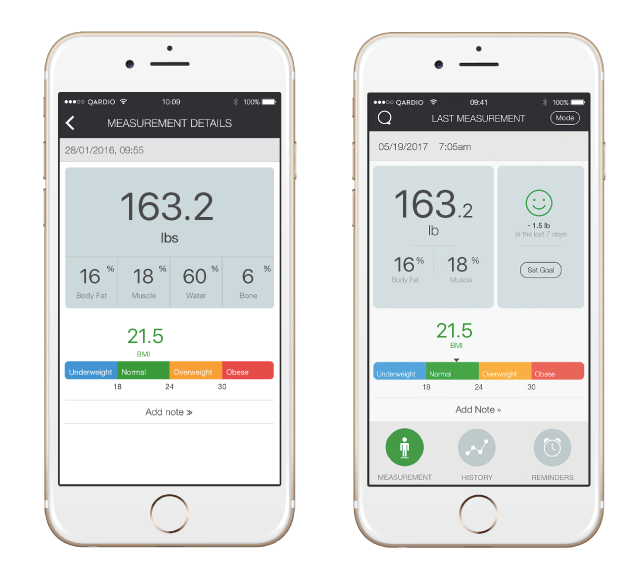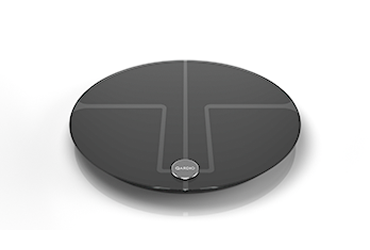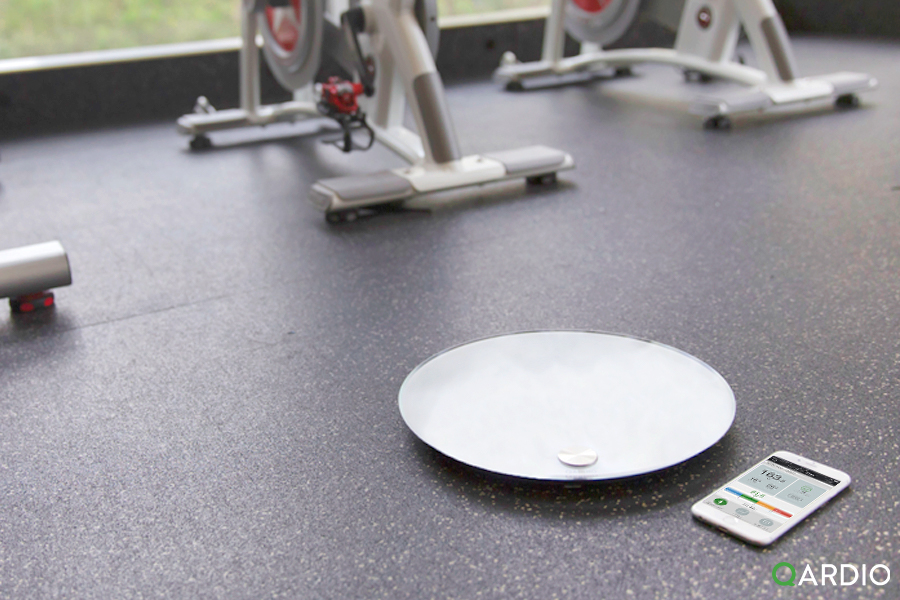QardioBase measures weight, calculates body mass index and analyzes body composition. This article breaks down each measurement your smart scale provides, helping you better understand your body.
The free Qardio App displays your results and keeps track of goals and progress:
Body Mass Index
Body Mass Index (BMI) is a weight-to-height ratio used to determine if someone is at a healthy weight. BMI is calculated with the formula below.
BMI=Weight(Kg)/Height(m²)
The Qardio App shows your result on a scale from underweight to obese. For example a person who is 5’ 5” and 116lbs has a healthy BMI of 19.4, which is considered ‘normal’.
However it should be noted that people with a lot of muscle mass, BMI may not the best determinant of a healthy weight. Athletes, for example, might weigh a lot because all the muscle they carry and have a BMI of ‘overweight’ or ‘obese’.
Body Fat
Body fat is the percentage of your body made up of fat. There are two medically accepted body fat % charts used to determine whether someone has a healthy amount of body fat.
You can learn more about types of fat such as storage and essential fat in our article ”What is a healthy body fat percentage?”
ACE Body Fat % Chart
The traditional ACE chart (shown below) determines if someone has a healthy body fat % based on gender and fat percentage only. For example, a woman with 20% fat would be considered ‘athletic’.
Jackson & Pollock Body Fat % Chart
The Jackson & Pollock chart (shown below) is the new industry standard for determining a healthy fat percentage, taking into account age, gender and fat mass. For example a 42 year old man with 24% body fat is considered to have ‘average’ body fat percentage.
It is important to remember that any body fat % chart show averages only. Everyone is built differently with their own unique fat distribution.
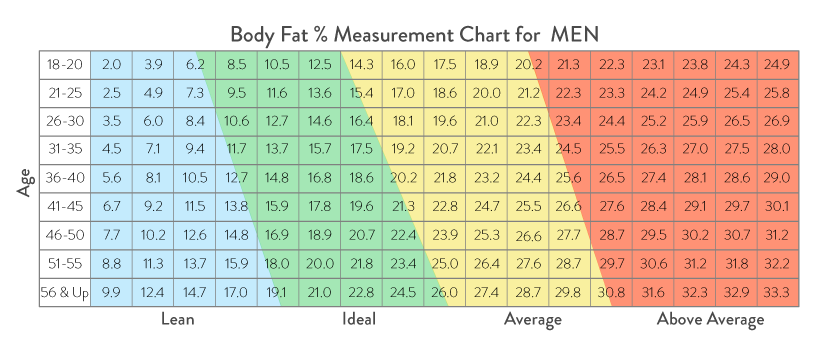
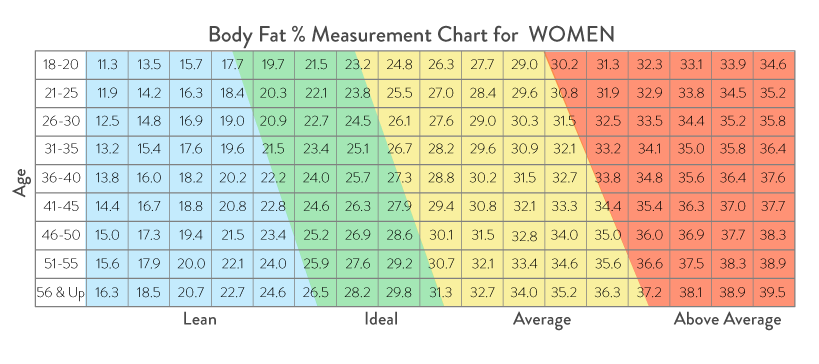 Muscle Mass
Muscle Mass
Muscle mass is the percentage of muscle in the body as compared to total body weight.
To set goals for yourself, keep an eye on the muscle mass reading on your QardioBase. For example, if you are trying to gain muscle and tone up, exercise regularly and QardioBase smart scale will show your progress.
There is no ideal muscle mass because this number varies greatly with height and body type.
Muscle Mass & Basal Metabolic Rate
As your muscle mass increases, so will your basal metabolic rate (BMR), the rate at which you burn calories. In other words, exercise usually leads to fat loss, muscle gain and a faster rate of calorie burning.
Water Composition
Water composition is the percentage of body fluid as compared to total body weight.
The human body is 50-75% water. The average adult male has 50-65% water and the average female 45-60% water. Higher rates of water content are found in babies and children.
Variations in water content are caused by many factors:
– Salt
– Sugar
– Alcohol
– Dehydration
– Dieting
– Women’s monthly cycle
Water is a crucial part of staying healthy. It keeps us focused, regulates body temperature and insulates our organs. We lose water constantly through sweat, urine and breathing. To keep hydrated drink about 2 liters of water per day, more if you are exercising and use your QardioBase to ensure you have a healthy water content.
Bone Mass
Bone content is the percentage of bone mineral as compared to total body weight.
The average bone content for adults is 3-5%. This measurement is good to keep track over a long period of time as bone mass can decline slowly with age.
Factors that can increase risk for bone loss:
– Low calcium
– Women post menopause
– Smoking
– Alcohol
– Inactive lifestyle
– Gender (women are more likely to develop osteoporosis than men)
– Age (bone loss increases with age)
For strong bones, try exercising regularly, eating foods high in calcium, taking multivitamins and skipping cigarettes and alcohol. Use QardioBase to track bone content and if you notice a decrease, talk to a doctor right away.
We hope understanding these body composition and BMI measurements is useful. Good luck on your health and fitness journey!
